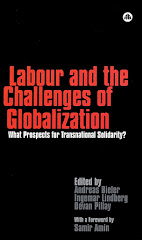Capital
has identified water as an important opportunity for profitable investment.
Whether it is the privatisation of public water infrastructure, the expansion
of the bottled water industry, the construction of dams for energy generation
or the free expropriation of water for mineral extractivism or large-scale
agriculture, private capital has poured into water in large quantities. And
yet, water is also an area where resistance to capitalist exploitation has been
most successful as reflected in a wave of re-municipalizations of water
services across the world (Kishimoto, Lobina and Petitjean 2015). How can we make
sense of these struggles against water commodification? In our recent article Water Grabbing,
Capitalist Accumulation and Resistance in the Global Labour Journal, we
develop a conceptual-methodological approach to this question.












